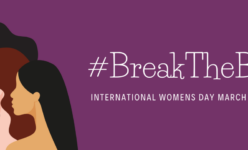
Revisiting the Call for Financial Transparency in Banking
Banks must reveal certain data about loan applicants
In February 2021, La Voix de l’Est published an important article by Maan Alhmidi, highlighting the push for Canadian banks to disclose race, gender, income, and location data to ensure fairer access to credit and loans. Organizations representing racialized and Indigenous business owners argued that without transparency, systemic barriers in banking would continue to limit economic opportunities for marginalized entrepreneurs.
Now, in February 2025, as we reflect during Black History Month, the question remains: Has progress been made, or do we still need to push for accountability in financial institutions? Have these concerns been addressed, or do we need to reignite the conversation on equitable banking practices?
As we repurpose this article, I invite you to revisit the original call to action and consider where we stand today. The need for financial equity is ongoing, and ensuring inclusive access to capital remains a critical conversation.
Read the original article here: La Voix de l’Est – February 2021 (English translation below)
OTTAWA — Canadian banks should be required to disclose data on race, gender, income and location to ensure fairer access to credit and loans, say organizations representing racialized and Indigenous business owners. They are calling for federal action.
Black business owners face microaggressions, unconscious bias and discrimination in the banking sector, says Nadine Spencer, president of the Black Business and Professional Association. Publishing the data would help hold banks accountable.
“In order for us to move forward, we need to look at the data, look at the gaps and fix the problems,” she says.
Spencer wants governments and financial institutions to talk to business owners and ask them what they need.
“The first thing financial institutions can do is treat every customer as a contributor to their revenue base and respect them the way they should,” she says.
In the United States, banks have been required to track loan applicants’ data by race, gender, income and location for more than 40 years under the Community Reinvestment Act. The measure was designed to encourage banks to better serve low-income neighbourhoods and racialized communities.
Duff Conacher, co-founder of Democracy Watch, suggests the federal government should emulate the Americans in this area to combat systemic racism.
“Four of our six major Canadian banks have U.S. divisions that have complied with the law for decades in the U.S., but they have done nothing here to shine a light on discrimination,” he says.
They are the Bank of Montreal, the Canadian Imperial Bank of Commerce, the Royal Bank and the Toronto-Dominion Bank.
Herbert Schuetze, an economics professor at the University of Victoria, says releasing such data would encourage more researchers to look at whether businesses owned by racialized people get the same access to credit and other services. He points out that American studies have shown a difference in treatment for racialized people in the United States and laments that such research cannot be effectively conducted in Canada.
“I wouldn’t be surprised to see this problem [here], but without the data, we can’t measure the magnitude of it in Canada.”
The federal government in September invested up to $221 million in partnership with Canadian financial institutions to create Canada’s first-ever Black Entrepreneurship Program.
Conacher said the program is insufficient.
A spokeswoman for Finance Minister Chrystia Freeland said the Liberal government is open to further measures, though it has not committed to them.
“The federal government is currently undertaking pre-budget consultations. We invite all Canadians to share their ideas and priorities,” said press secretary Katherine Cuplinskas. “We know there is much more work to be done.”
RBC spokesman Andre Roberts said the bank does not collect race or gender information when clients access services and noted that the bank is a participant in the Black Entrepreneurship Program.
Bank of Montreal spokesman Jeff Roma did not say whether BMO supports the data disclosure, but also noted that it is a participant in the federal Black Entrepreneurship Program.
TD Bank did not say what its position is on the issue, while CIBC did not respond to The Canadian Press.
“Banks already collect this data for all of their borrowers and can easily add a box on the form asking if they want to be identified as a member of a visible minority,” Conacher said.
Vivian Kaye says she has faced discrimination from her bank since she started her business eight years ago. Bank agents often questioned her money transfers and never offered her a line of credit, even though they could see her business was growing.
Caroline Shenaz Hossein, a York University business professor, believes disaggregating the data could help us understand who has access to banking services in Canada — and who doesn’t.
She says many Black people, including herself, turned to online banking even before the COVID-19 pandemic to avoid facing racism in bank branches.
“I hated the humiliation. I was looked down upon as if I was some kind of accomplice to a terrorist because I’m a Black Caribbean woman,” she says. “We already know about systemic racism and it exists. We don’t need data to tell us more. We want to know who’s actually getting the loans.”
Shannin Metatawabin, CEO of the National Aboriginal Capital Corporations Association, which provides alternative financing to Indigenous businesses, says publishing banking data would allow organizations like hers to create new products or advocate for better services.
“Historically, Black, Indigenous and people of colour have always been an afterthought. Meeting the needs of our community has always been preceded by meeting the needs of traditional customers.”
Schuetze believes creating a rating system for financial institutions to encourage them to lend to minority-owned businesses would have a positive impact.
Other measures that could help combat this discrimination include providing start-up grants to minority-owned businesses. “If you can reduce the barriers, then obviously access to capital from financial institutions will increase.”
This story was written with the financial assistance of the Facebook and Canadian Press News Exchanges.

























